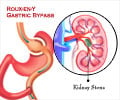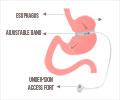Complications & Risks of Bariatric Surgery or Weight Loss Surgery
Surgical mortality from bariatric surgery is generally less than 1%. Risks involved vary with the procedure, patient’s age and medical conditions, and the expertise of the operating team.
Males have increased risk for morbidity and mortality compared to females undergoing this surgery.. What follows is a list of the possible complications of bariatric surgery:
- Bleeding from the intestines
- Infection of the wound
- Blockage, tear in the bowels
- Food intolerance
- Vomiting or straining after surgery before the incision heals can cause a hernia. Laparoscopy assisted surgery greatly reduces hernia risk.
- Depression
- Nutritional consequences: Deficiency of calcium, vitamin D, vitamin B-12, iron.
- Gastroesophageal reflux
- Hiccups and bloating may occur due to the enlargement of the bypassed stomach
- Ulcer
- Blood clots in the legs or lungs
- Heart attack
- Pneumonia
- Urinary tract infection
Anesthetics problems may occur as in any major operation.
In bariatric surgery a condition called "rapid gastric emptying" or Dumping syndrome can occur. Dumping syndrome occurs when the lower section of the small intestine (jejunum) fills up too quickly with undigested food from the stomach, causing unpleasant digestive effects. Dumping syndrome can also be triggered in gastric surgery patients by consumption of simple carbohydrates (sugar, or some starches) or carbohydrates with a high glycemic index.
There are two variants of rapid gastric emptying: early and late dumping.
Early dumping typically starts during or immediately after a meal with symptoms like:
- Abdominal cramps
- Bloating
- Palpitations
- Nausea
- Vomiting
- Diarrhea
- Shortness of breath
Late dumping typically occurs 1-3 hours after eating with symptoms like:
- Weakness
- Dizziness
- Fatigue

























